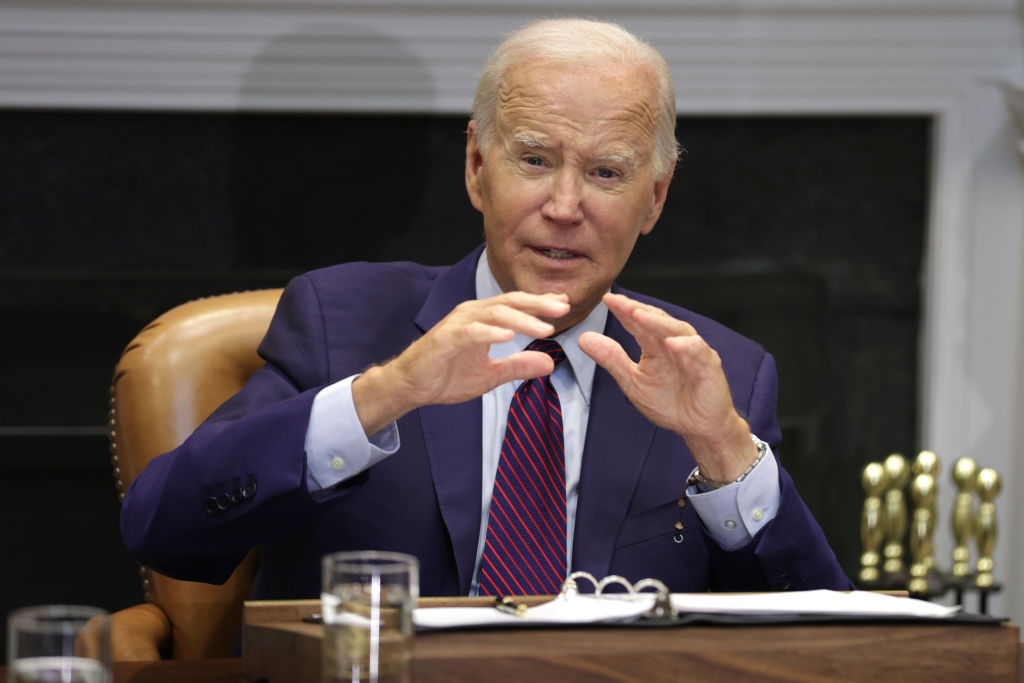It’s becoming all too clear that the Biden administration doesn’t understand the threat China poses to America and the free world, or how to deal with it.
President Joe Biden signed an executive order on August 9 purporting to ban U.S. companies from investing in certain advanced technologies in China. But at the same time the administration was trying to look tough on Beijing regarding AI and advanced semiconductors, Commerce Secretary Gina Raimondo was flying to Beijing to stress how “profoundly important” a “stable economic relationship” with China is, tech bans notwithstanding. She’s just the latest in a long line of administration officials sent to kowtow to President Xi Jinping and his cohorts (in Treasury Secretary Janet Yellen’s case, almost literally kowtowing in body as well as spirit), in hopes that if we look fawning and acquiescent enough Beijing will behave itself on the international stage—at least until the 2024 election.
But perhaps there’s no contradiction here. A closer look reveals that the August 9 executive order, far from getting tough with China and its U.S.-based financial enablers, barely interrupts the U.S.-China high-tech nexus that feeds China’s global ambitions at America’s—and freedom’s—expense.
Of course, everyone, even Biden, understands that China is steadily overtaking us in the development and deployment of technologies that will dominate the future like AI, quantum, 5G telecommunications, and supercomputers.
For example, already by 2017, Chinese venture-capital investors made up 48 percent of all AI venture funding globally, surpassing the United States for the first time, while in 2020 former Google CEO Eric Schmidt was warning that China would soon overtake the U.S. in AI capabilities. (One area where we still have something of a lead is semiconductors for AI and other advanced uses.)
With that in mind, according to Reuters, “The long-awaited order authorizes the U.S. Treasury secretary to prohibit or restrict U.S. investments in Chinese entities in three sectors: semiconductors and microelectronics, quantum information technologies and certain artificial intelligence systems.” The goal is “preventing American capital and expertise from helping China develop technologies that could support its military modernization and undermine U.S. national security.”
In fact, there’s far less here than meets the casual eye.
For example, the ban only affects future investments, not existing ones, although Treasury reserves the right to ask an American company to disclose how long it’s been indirectly helping Chinese intelligence services to spy on the Uyghurs, or helping the People’s Liberation Army use AI to develop its long-term war plans.
Secondly, and most astonishingly, publicly traded companies are exempt from the ban. It’s aimed at private equity and venture capital firms which, according to market data firm Pitchbook are already losing interest in investing in China, given the political and economic risks.
This means America’s biggest companies—not only Google and Amazon, but JPMorgan Chase and Bank of America—won’t feel any pressure to sever or reduce their ties to Communist China’s high-tech sector.
This isn’t how you win the high-tech war with Beijing.
Moreover, the fact that whatever private Chinese companies develop automatically belongs to the Chinese military and intelligence services under the guidelines of the CCP’s Military-Civil Fusion policy means that trying to restrict AI investments only to those systems used for “military, government intelligence, or mass-surveillance end uses,” is more than useless. It’s deceptive, and like so much of the administration’s approach to China, it tries to look tough while also trying not to offend.
Besides, most of these restrictions are too little, too late. Chinese companies and the government have been feasting on U.S. intellectual property and technology transfers for two decades now. China is already moving fast to develop its own capabilities in all these areas, including the advanced microchips that will enable its most sophisticated AI applications, with or without the U.S.
Meanwhile, Reuters quotes a Chinese embassy official saying more than 70,000 U.S. companies continue to do business in China—even as more than 5,000 Chinese corporate securities that ignore federal securities laws or disclosure rules are traded in U.S. capital markets.
Many of these same companies that reap the benefits of American investment use child and slave labor, while many others are part and parcel of China’s military-industrial complex.
There are ways to significantly reduce or even sever the U.S.-China cash nexus that is letting American companies directly feed China’s rise to global hegemony—including using the U.S. tax code—without seriously endangering the larger trading relationship that inevitably exists between the world’s two biggest economies.
The Biden ban isn’t one of them. It’s a cosmetic fix done for appearances only, while the real China threat continues to grow—with American capital speeding it along.






Please note that we at The Dispatch hold ourselves, our work, and our commenters to a higher standard than other places on the internet. We welcome comments that foster genuine debate or discussion—including comments critical of us or our work—but responses that include ad hominem attacks on fellow Dispatch members or are intended to stoke fear and anger may be moderated.
With your membership, you only have the ability to comment on The Morning Dispatch articles. Consider upgrading to join the conversation everywhere.